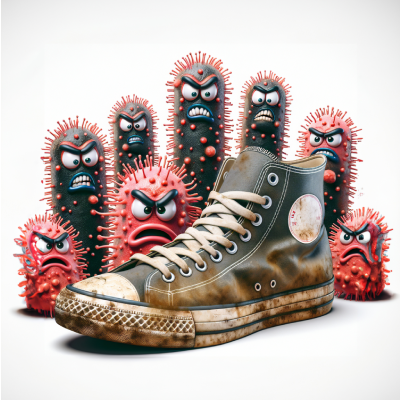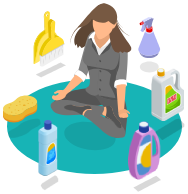
Should You Wear Shoes Inside?
Introduction
Did you know that 95% of shoes have fecal bacteria on them? Today we delve into the timeless debate that divides households worldwide: should shoes be allowed inside? It's a question that sparks passionate arguments and entrenched beliefs, with advocates on both sides staunchly defending their positions. But beyond personal preferences, what does science have to say about this contentious issue?
Let's lace up and explore the myriad of reasons why kicking off your shoes at the door might just be the best step for your health and home hygiene.
Don't Want Dirty Floors? Get Your Shoes Off!
- Bacteria Brew: Picture this: you've been out and about, navigating through bustling streets, public transportation, and perhaps even a restroom or two. All the while, your shoes have been silently collecting a cocktail of bacteria, dirt, and grime. It is one thing to just mop the floor, but studies have shown that shoes can harbour potentially harmful bacteria like E. coli and C. difficile, which can be transferred to your floors, carpets, and even furniture upon entering your home. Yikes! By leaving your shoes at the door, you're minimising the risk of bringing these unwelcome guests into your living space.
- Chemical Conundrum: It's not just bacteria that hitch a ride on your shoes; they can also track in chemicals from various outdoor surfaces. Pesticides, herbicides, and other toxins present on sidewalks and lawns can cling to the soles of your shoes, posing a potential health hazard, especially if you have young children or pets who spend a lot of time playing on the floor. By adopting a no-shoes policy indoors, you're reducing exposure to these harmful substances and creating a safer environment for your loved ones.
- Allergen Alert: If you suffer from allergies, you might want to think twice before traipsing through your home with your shoes on. Pollen, mould spores, and other allergens can easily hitch a ride on your footwear, exacerbating symptoms and making indoor air quality issues worse. By keeping shoes outside or designating a specific area for shoe removal, you can minimise the introduction of allergens into your home and breathe easier.
- Floor Damage: Beyond the health implications, wearing shoes indoors can also take a toll on your flooring. High heels, cleats, and even everyday footwear can cause scratches, scuffs, and dents, particularly on hardwood floors and delicate surfaces. By going shoeless indoors or investing in indoor slippers, you can prolong the life of your flooring and save yourself the hassle (and expense) of repairs down the line.
- Cultural Considerations: It's worth noting that the no-shoes policy isn't just about avoiding dirty floors; for many cultures, it's a sign of respect and hospitality. In Asian households, for example, it's customary to remove shoes before entering to maintain cleanliness and show reverence for the space. By embracing this tradition, you're not only keeping your home cleaner but also honouring diverse cultural practices.
Conclusion
In conclusion, while the debate over wearing shoes indoors may never be fully settled, the evidence overwhelmingly points towards the benefits of kicking off your kicks at the door. From reducing bacteria and chemicals to preserving indoor air quality and floor integrity, there are plenty of reasons to embrace the no-shoes lifestyle. So why not take the first step towards a cleaner, healthier home today? Your floors (and your feet) will thank you!
Looking for floor cleaning products? Check out our range by clicking here.
Stay Connected
Stay connected and be the first to know about our latest products, special offers, and exciting news:The Cleaning Blog
Want to learn more about cleaning? From the latest cleaning and hygiene news to handy how-to guides, why not check out our most popular blog categories.Stay Connected
Stay connected and be the first to know about our latest products, special offers, and exciting news:











